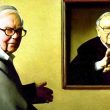by Richard Rosso, Head, Financial Planning Advice, RIA Advisors
Daniel R. Solin, a New York Times best-selling author who penned a series of popular books with the overarching theme of how to be the ‘smartest,’ with money, recently wrote an article where he shared what he believes is The One Trait That Predicts Advisor Success. Mr. Solin makes a convincing case for curiosity as the dominating trait that separates a great advisor from a marginal one.
I agree curiosity is critical to success not only to prosper in a chosen vocation, but for success overall in life (which is mentioned by Mr. Solin). Although biting curiosity bordering on obsession along with an insatiable need to learn should come natural to successful advisors, it’s not the most important quality.
Oh, curiosity and a thirst for knowledge is absolutely near the top of the list. However, there’s an overpowering internal force some professionals possess. These advisors are passionate advocates for clients and anybody who seeks help making money decisions.
Fellow professionals will disagree with my belief that those who work the frontlines for big-box brokerage firms cannot sincerely be advocates for clients; loyalty is dictated by their employers. Energy and focus are directed toward sales quotas that must consistently be exceeded to remain employed.
I’m not saying brokerage firm representatives don’t care about customers. I’m fortunate to know financial professionals who strive to do the best for consumers of their products. However, if ever in an awkward position to choose between an employer and the client, the employer will win every time.
In other words, loyalty comes with constraints and that fact will never change.
An imminent “Best Interest” SEC rule for brokers won’t alter behavior, either. The legislation is designed to obfuscate the boundaries between salesperson and fiduciary – a professional who adheres to the following tenets (per www.fiduciarystandard.org):
Five Core Principles:
- Put the client’s best interests first;
- Act with prudence, that is, with the skill, care, diligence and good judgment of a professional;
- Do not mislead clients–provide conspicuous, full and fair disclosure of all important facts;
- Avoid conflicts of interest;
- Fully disclose and fairly manage, in the client’s favor, unavoidable conflicts.
The culture of a large brokerage firm is driven to sell product and make decisions primarily in the interest of shareholders. Currently, brokerage firms are threatened by the Certified Financial Planner Board’s slated enforcement (October 1, 2019), of a revised Code of Ethics and Standards. The enhanced code is a vast improvement as it clarifies the Certified Financial Planner as fiduciary at all times, in every financial interaction. In other words, the Board is returning the profession to its roots as set forth by the Founding Father of financial planning, Richard Wagner.
In his writing “Financial Planning 3.0,” published post-humous, Richard Wagner, JD, CFP® shares the following:
“Let’s face the ugly truth. Many licensees use the CFP® marks just for sales purposes in order to augment their apparent credentials. First, we have those whose employment circumstances require that their first loyalty is to their employer. Next, we have those successors to my first manager who believe the most important function of a financial plan is to pound sales. They will look you square in the eye and tell you they are “advisors” when they put together financial plans but “buyer beware” salesmen when it comes to implementation. They take off one hat and put on another with nary a thought about conflict or confusion.”
“At the end of the day, “CFP®” must stand unambiguously as both the trademark and hallmark of fiduciary advice.”
As a client of a broker dealer, watch to see if your advisor drops the CFP® mark to remain employed. If so, he or she has chosen not to act as fiduciary.
In my opinion, empathy is a spark which ignites traits one should seek in an advisor – a curious nature about peoples’ lives, motivations, histories, a ravenous need to gain knowledge and the personality of a nurturer.
My childhood centered around the ebb and flow of an eclectic socio-economic urban caldron of families, single parents, police officers, union laborers, salespeople who maintained various levels of communication with each other in a close-knit predominately Italian and Jewish Brooklyn neighborhood.
Grandmothers’ doors were slightly ajar in the summer for neighborhood kids to visit for a snack or a full-course meal which rivaled local restaurants. I sat in on conversations, observed and was embraced by a rich mix of races and cultures.
From Leon the superintendent of our three-story post-WW2 brick apartment complex (his nephew James was one of my best friends), to widowed, elderly Sophia in a top floor enclave who kept fresh, sliced semolina Italian bread on the kitchen table – I spent countless hours with these extended families to escape and complement my own.
I reveled in fun stories, felt their heartaches. I was fascinated by how urban dwellers survived, the experiences and daily travails which forged who they were. I respected boundaries – Right down to off limits set by plastic covers on fancy gold velveteen couches (more for show, less for sit). These individuals weren’t strangers, they weren’t friends, they were more. For my own survival, I needed to care about them too.
Later in my teens, let’s just say I got by gracefully due to kindness of strangers. Negotiation with bullies to avoid getting mugged or knifed was a gift I brought to the table on subway excursions to Coney Island. I felt for these people; I’d imagine their plights. I was able to step into their shoes and feel kindness.
Ironically, several would-be juvenile muggers became friends. After all, we had much in common as lower income city residents (although I never delved into criminal behavior). However, I believed I understood what drove those rather intimidating souls to cross lines. Ostensibly, they just didn’t seem so intimidating anymore. They were outliers, granted. I believed we were all a meal or job away from becoming outliers ourselves.
Empathy became a way of life for me. It added richness and engagement to my childhood. At times, I felt like an observer of human plight. At night, I’d journal my experiences. The nuances of these lives fascinated me. Not the stuff the outside world knew. It was the stuff going on, discussed at dining room tables or in living rooms before the Jonathan Winters Show came on television, that thrilled me. I was granted silent permission to listen. I was allowed to sit among families as they shared the good, wept over the tragic. It was such an honor. I was diligent to not disrespect unspoken privileges provided to me.
Over time, empathy developed into nurture and protection; loyalties to friends, the old guys who hung out at Joe’s Grill on Avenue U all day, every day, the elderly widows who supplied me regularly with meatballs steeped in red sauce so thick it was 2 shades close to black. And deep dishes of pasta. Lots of pasta.
Oh, and how can I forget Tony, a cook at Casa Bella Italian Restaurant. Late in the day and preparing for the dinner crowd, Tony would make time to sneak through the back door and hand me two hot potato and cheese croquets. I can still taste them. He’d pass them through the holes in the chain-link fence that separated the back of the restaurant from the rear of the apartments.
Let’s say I never went hungry.
Daniel Goleman outlines three definitions of empathy – cognitive, emotional and compassionate. A successful advisor should possess a bit of all three but I’m going to focus on cognitive empathy.
Cognitive empathy is simply knowing how another person feels, what they may be thinking. This type of empathy can help with negotiation or motivate people to act. As advisors, we must care enough to help clients understand their cognitive and emotional biases, especially during periods of market turmoil. We must remain non-judgmental listeners who genuinely care about client outcomes. Good advisors understand when compromise is an appropriate choice.
For example, during the height of the financial crisis, there were long days of face-to-face, back-to-back meetings. I encouraged clients and those who sought guidance to open up about what was going on in the economy, their lives and portfolios. It was very emotional. Some of the stories were tragic – lost jobs, lost savings, lost souls. Frankly, regardless of recovery, these stories still haunt me.
I was sort of lost myself yet thankful I began to study the Great Depression in 2005 which made me less of a deer in the headlights. I purchased vintage copies of the Magazine Of Wall Street dated 1927-1940 from eBay and book dealers across the country. Today, I maintain a stack of these periodicals close to four feet high and randomly go through them every month. It’s fascinating how history and the current often intersect.
No matter how much cash our group maintained in portfolios at the time (anywhere from 30-50%), in a client’s eyes, it was never enough. Heck, we didn’t even know if cash was safe as some money markets were breaking the buck or their $1.00 per share prices. In other words, during the Great Recession, any failure or tragedy was fair game to consider.
Instead of discounting feelings and advising clients to sit there and do nothing because “markets always come back,” I went through various exercises to motivate clients to go ‘all out there’ and explore the possible fruition of their greatest (bordering on panic), fears.
What’s cool about the brain is how beliefs can take on the feel of reality. It’s also not so cool how the brain goes direct to the greatest fear first which is usually a far stretch from what occurs.
We played the Poltergeist game.
In the 1982 film written and produced by Stephen Spielberg, a young family moves into a planned community only to find out their home was built on a cemetery where the stones were moved but the bodies weren’t. Let’s just say the anguished souls are not happy about it as they’re trapped and seek to move on.
There’s a scene in the movie where a rope is tied around the waist of Steven Freeling (dad), who must go through to another dimension (in a closet), marked by brilliant light, to recover his daughter Carol Anne from “The Beast” who restrains the young girl in an effort to use her life force to prevent spirits from “crossing over.” The goal was for dad to snatch her from the evil presence and aggressively be pulled back through the closet by his wife, a psychic and her crew.
So, imagine you believe the end of the world is imminent. The largest corporations are going to go broke and the dollar is going to be worth a penny. Don’t hide, share your thoughts. I won’t discount them.
Now, I’m going to secure this rope around your waist (mentally of course). While I hold tight to the other end, I need you to leap willingly into another dimension of fear. I need you to explore what you think may occur and share it all with me.
Let your mind go where it’s been hesitant to roam. Or at the least, share with me the sentiments you’ve afraid to discuss with others. Once you’re out there, communicate your thoughts, I’ll pull you back into the real world and away from “The Beast.” Then we’re going to discuss and adjust. I’ll use examples from the Great Depression and how America eventually recovered. We’re also going to discuss the reality of how this is very, very bad and it could take decades to financially get back to where we were.
You see, investors willing to play my game, who freely vented frustrations and voiced the wildest, imagined outlier economic events, began to realize that they were ok to hold some percentage of stocks and not get all out. Maybe they were able to realize they were overacting. Either way, I was willing to listen and take the concerns seriously as opposed to telling people who lost so much, that I knew best and they should win some award for continuing to bleed wealth. Heck, we were all out there in the unknown back then. Any financial expert who tells you different is clearly lying.
Stock allocations weren’t going to be 60%, but at least they weren’t zero. Most investors settled between 10-30% in equities. As markets bottomed back in the summer of 2010, I was able to employ the same game to help investors battle a deep recency bias and slowly begin to build equity positions. Hey if you believe the stalwarts of the economy are going to crumble and your money isn’t going to be worth anything anyway, why not take a gamble when the market is at 13X earnings? I mean, what a deal if you’re wrong!
To me, empathy is the core of my personal success. It cannot be faked; however, it can be developed.
To be proficient at a job is rewarding. However, to be tested throughout life prepares an advisor to maintain an uncompromising stance if required to safeguard a client’s financial health (I’ve done it – it’s incredibly uncomfortable). A financial expert who lives his or her finest truth will find that making every decision for the greater good of the client becomes a natural and easy choice.
A broker’s disguise as confidant and protector to suit an employer’s goals would motivate me to find another line of work or at the least, a company that puts itself out there as a fiduciary.
Copyright © Richard Rosso













